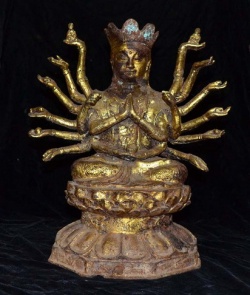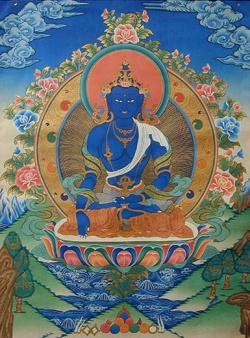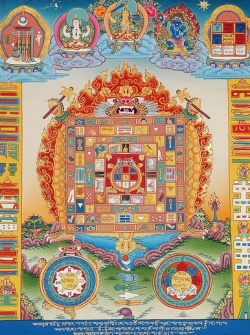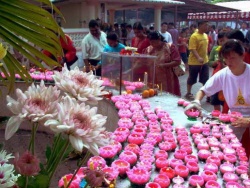The Clinical and Hygienic Concerns of Lord Buddha
by Ven. Dr. Sunanda Putuwar, Ph. D.
This is a research paper based upon the ancient Buddhist texts. The researcher is not a physician. The Buddha, founder of Buddhism, lived circa 623-543 B. C. in Jambudvipa (i. e. present-day Nepal and India subcontinent). Most of people at that time had little schooling. The only existing educational instructions were given by sages, ascetics, poets and philosophers. To educate the masses, The Buddha followed the traditional methods of education. Although the main Trust of hid teachings centered on Spiritual emancipation, one can find numerous instructions related to various aspects of worldly Life, viz., hygienic and clinical concerns, the correct accumulation of Wealth, education and ideas concerning Life and society. The Buddha was interested in the well-being of the men and women in every aspect of Life. One of Life’s most central concerns is good health. The Buddha’s instruction concerning heath is scattered throughout the ancient Buddhist texts, especially, in The Vinaya Pitaka and The Sutta-Pitaka. In The Mahavagga, there is a whole chapter on clinica/medical instructions called Bhesajja Khandha and another called Bhojana Khandha (section on Food) for Monks. The author encourages modern-day physicians and scholars interested in ancient herbal medications to conduct studies and experimentation guided by these texts and commentaries. The author strongly recommends those in the very rich corpus of psychological material to research the Buddhist texts, especially The Abhidhamma Pitaka.
According to my research, The Buddha can also be considered in a certain sense, a medical advisor. Buddhist history shows that The Buddha himself attended Putigattatissa. There a when he was seriously ill with a skin eruption which covered his entire Body with suppurating sores. A female lay devotee known as Suppiya Upasika is recorded to have healed her enormous wound by The Buddha wielding his psychic powers. There are many other instances in which devotee were cured by the Loving-kindness of The Buddha, by his expounding of Dhamma and by the Monks Chanting holy Suttas (scriptures). There are numerous Suttas for such purposes, especially the Bojjhanga Sutta, Giri (mananda) Sutta for Healing illness through methods similar to psychological therapies. The Angulimala (Paritta) Sutta has been recorded as powerful support for safe and easy childbirth. As medical Doctors endeavor to cure diseases of patients and restore their good health, The Buddha concentrated his efforts in giving people the medicine of instruction by which a person can overcome all sorts of Mental illness and negative feelings. Lust (Raga), Anger (dosa), Delusion (Moha) and jealousy are considered illness which can lead to the persistent sickness of Suffering, both mentally and physically. The Buddha recognized two kinds of illness: disease of the Body and disease of the Mind. According to him there are certain people who can remain free from physical illness for ages, there is hardly anyone, however, (except those in whom asavas or latent Defilements have been completely uprooted) who can remain, even for a minute, without the infliction (unaffected) by the Mental illness of Greed, hatred, jealousy, frustration, distress, depression and like diseases. It is said by a Buddhist writer: “The principal causes of Mental disease are: distracted Thought and unnecessary skepticism, Feeling guilty, dissatisfaction and disappointed, and melancholy or depression.” All these are derived from the roots ingrained in Raga, dosa and Moha.
According to The Buddha, all diseases or sicknesses can distinctively fall into two categories: curable and incurable though they are not unrelated to each other. Natural laws or cosmic principles (niyama) are regulations of health and govern as well, all things in the Universe. The (niyama is grouped in) five categories. They are: weather (utu), Food or seed (Bija), action (Kamma), Knowledge or Mind (Citta), and physical and Spiritual matters (Dhamma). Health and sickness result from co-operation and counter-action of these elements. An imbalance of these elements are the principal causes for all kind of illness. According to Ashoghosha, The Buddha said, “Due to insufficient Food, change of weather, unfit dwelling place, not having a good friend (or staying with those whose way of Thinking (and ways of living) are different and bad economical situation etc., man becomes victim of disease)”. Wisdom or Knowledge is the main antidote for Mental disease. Wisdom can be a remedy of physical disease as well. Meditation on breathing in-and-out is a direct remedy for certain Mental disease (i. e. agitated, distracted nature or symptom(vitakkacarita), Indirectly, it can help cure physical diseases. Physical aliments arise due to poor and insufficient diet, mal-nutrition, lack of sleep and exercise, unbalanced work, weather and many other causes. The Buddha said that a person contributes to illness when one does not treat oneself well with what is proper (sappaya); he/she metes thing (sappaya) out without Knowledge; eats unripe things which should be eaten only after becoming ripe, or does not cook Food well; one is without Virtue or does not practice Celibacy (abrahma-cari); goes about at unseemly times or remains in the company of bad friends. All these factors contribute to illness.
Endowing one with the opposite qualities will cause health to spring forth. Pointing out the importance of health, The Buddha said, “Health is the highest gain (arogyaparama labha). Freedom from all illness (sabba-rogavinimutto), freedom from all Heart-burning, with lamentation (sabbha-santapavujjito), absence of illness (nirogi), or good health is appreciated and applauded, everywhere in the Buddhist texts. Though health fluctuates all one’s Life, the pride of health (arogyamada) is one of the greatest concerns in Life. The wish of longevity and health (ayuarogyasampatti) is daily chanted by Monks as a part of Blessings bestowed to people. Some of the popular terms frequently pronounced in the ancient Buddhist texts for good health are: Sukhibhaveyan nidukkho (may you be happy free from Suffering), nidukkho (absence of Suffering), arogya (good health or freedom from illness), nirogananda (Happiness derived from the absence of illness), khamaniyam yapaniyam (at ease or bearable, indicating good health). The lost of health is the supreme lost (of Happiness). The Aggregates of human being is the home of illness. The Buddha said, “Hunger is the worst illness, compounded existence the worst Suffering or aliment (Dukkha). If you are ill, one or more medications may effect a cure and keep one healthy for a period of time. The discomfort of hunger frequently returns in a few hours, no matter how much and what kind of Food and drink is taken. To survive, one must continually fin nourishment. The illness of hunger will come back over and over again until the time of Death. We are always only one or two meals away from the discomfort of hunger. This may be the main reason that The Buddha remarked that hunger is the worst illness. When a person is in an advanced stage of starvation, the Body begins to consume itself. It is said by medical authorities (experts) that hunger is the most severe pain.
Some of the popular disease prevalent in Magadha (Northern India in the time of The Buddha were: leprosy (kuttham), ulceration (gandho), eczema (kilaso), consumption (soso) and epilepsy (apamaro). Malaria (ahivatakaroga or “snake-wind disease”) and diabetes (madhuragu) were also commonly known diseases. In the time of The Buddha, the most famous physician was Jivaka Komarabhacca who was the private physician of King Pasenadi Kosala, as physician to The Buddha and his Sangha. Jivaka cured the king of his hemorrhoids (fistula) with a single application of ointment. Once when the Lord Buddha was sick, the physician Jivaka made him a concoction from three fragrant Lotus Flowers mixed with other medicine to release his bowels. Jivaka gave The Buddha this medicine in a inhalation compound. After his recovering Jivaka offered The Buddha excellent Food like ambrosia. History records that Jivaka performed a brain surgery on a patient, a merchant of Rajagaha, who suffered with serve headaches for seven years. He was close to Death from this Affliction. Jivaka cut open the scalp and removed two living creatures (panakas) and closed the skill with sutures. He applied an ointment and cured the man. He also performed abdominal surgery on a man from Banaras, who suffered a twisted bowel and saved his Life. Many disease and problems occur through improper attitude with regard to the sexual impulse. The proper attitude towards allowable sexual conduct or chastity for The Sangha of Monks and nuns was emphasized by The Buddha. With intention, a Monk cannot emit semen except in Dreams. A Monks or nun may not indulge in sexual intercourse. With a view to preventing disease that would arise from contaminated water (as well as to save living creatures which may be present in the water), The Buddha advised Monks (Bhikkhus) to filter properly with a piece of cloth before drinking Bhikkhus are advised to wash their begging bowls before and after eating. Keeping the Body is enjoined, the nails are to be trimmed neatly so that no soil can remain on fingertips and carelessly eaten with Food (In India, Food is eaten with one’s hands). The ears, teeth and sexual organs are to be kept clean. Regulations advise the washing of feet before entering their residence. (For only open sandals are worn). Robes should be spread out and dried in the sun, although the germ theory was unknown in these days. Extra robes must be dried in the sun from time to time. Everyday, after one’s meal a Monk’s bowl is to be washed out properly and dried in the sun. The lavatory and latrine must be kept washed out properly. One’s residence must always be clean and neat. The windows should be kept open during the night in summer or in the hot season, and be kept closed during the day vice versa in the cold season so that external weather contributions would not effect one badly:
With a view to maintaining on hygienic atmosphere, The Buddha laid down rules for Monks not to spit, urinate, etc, in water or on grass. In The Mahavagga, Vatthakkhandaka says that one should dry bed sheets and Clothes everyday. Monks should sweep and clean their dwelling places. It is a violation of a Sangha rule to keep an untidy residence. The Buddha said that one should live in a suitable location or environment (patirupadesa vasa) for good health and peace of Mind. To preserve good health one should take moderate amount of nutrition Food at regular times. Moderate meals are soon digested making one feel comfortable, and protects the Life-span (ayupalayamti). With regard to moderation at mealtimes, one still wishes to continue eating two or three more mouthfuls, but then stops eating and drinks some water to fill the rest of the stomach. It is always beneficial to all people or to patient to have some idea of the matters and actions profitable or unprofitable to one’s health. Many diseases arise due to careless actions, bad Food and drinks. To cure many disease, good diet, medicine and loving care are important. The Buddhist scriptures describe ghee or clarified butter, fresh butter, oil of sesame or mustard, granulated sugar or molasses, and Honey as medicine. It seems that Monks and nuns used these items mixed together as well as separately. Catumadhura is a mixture of four sweets: ghee, Honey, sugar and sesame oil which a Monk or nun is permitted to take if one so desires. Some of most popular medicines often mentioned in the Buddhist texts for The Sangha are four irregular things (maha-vikatani), viz. (a decoction of) dung or excrement (gutha), urine (mutta), aches (charika) and clay or earth (matika) applied against snakebite.
To cure a Monk who drank poison, The Buddha advised other Monks to make him drink (a concoction of) dung probably advised as an emetic. He also advised Monks to make a patient drink mud turned up by the plough as medicine against a poison substance. A drink of raw lye was prescribed against constipation. A compound of cow’s urine and yellow myrobalan was used medically against jaundice. To recover from sickness it is essential to have good medical treatment, a suitable medicine, a skillful physician, a hospital or suitable hygienic place to live, kind attentive nurses or attendants. According to The Buddha, a patient should posses healthy attitudes with respect to recovery. Negative qualities in a patient impede recovery. A patient with an unwholesome attitude does not treat himself with proper things (sappaya), does not known the measure of proper things (Sappaya mattan) in the course of treatment, does not apply medicaments; does not inform the extent of the illness to one who compassionately tends him/her; nor is the discomfort of illness borne patiently; nor described the onset of bodily aches and pains as shooting, stabbing and so on. The patient developing the opposite qualities is sure of gaining help. A patient hoping or speedy recovery of health ought always follow the principles of healthy living. To make easy reading the ideas of the above passage can be re-arranged in the following ways:
1. It is advised to live in a healthy surrounding, Good weather is, of course, important for general health. Living with amiable friendly persons is of great advantages. Taking hygienic good Food and drink and doing only those things beneficial to health is enjoined as a correct way to live. Carefully using exercise (byayama) or postures that conduce to health, such as, stretching, etc, is proper. Abandoning practices deemed as unhealthy is advised:
2. To know, make use of and take only moderate amounts of Food and drink which are known to be beneficial to health. In other words, excess or deprivation should be avoided in all things.
3. The patient must follow the advice of a God doctor, to confidently take accurate dosages of any given medicine and medical treatment as prescribed by a physician.
4. To clearly, completely and directly disclose or intimate all details about one’s sickness to the patients, physician or attendant. It is important to let the attendant know the condition of the disease, whether it is bring aggravated, diminishing, or does not abate but rather remains steady.
5. The patient should try not to get disappointed and perturbed when experiencing any kind of painful or disagreeable symptom, but rather try to endure the condition when it is possible to do so.
Not following all these considerations result in lessening the chances of curing one’s
disease, or withholds recovering it. Therefore, the patient who is being attendee should try to observe them, or be thoughtful so as not to worry his attendant. The above recommendations are enjoined by The Buddha to speed recovery. It is essential for any attendant, not to speak of a physician to whom a patient entrusts his/her Life, to bear in Mind these ethical principles. Though liable to manifest negative qualities at times, one attending a patient, who repeatedly demonstrates Anger and impatient, is not fit to wait upon the sick. These unwholesome qualities manifest as inability to prepare medicines; not discerning proper things (sappaya) from what is not proper, giving or Offering what is not proper, not giving what is not proper; hoping to gain (expecting-gifts) from one when waits on the sick, but not freely from goodwill; loathing to remove faces, urine, vomit and spittle; inability to instruct, rouse, gladden, and satisfy the sick with Spiritual, matter or Dhamma talk. One possessing the opposite qualities is fit to help patient. These unwholesome qualities will not contribute toward health. According to The Buddha, ayusa is that which leads to health or vitality. Health springs forth from the following qualities:
1. To arrange and provide Sound medical products. One must be expert in Offering medicine and treatment.
2. The attendant knows what is beneficial and what is harmful, keeping aloof from unbeneficial things but providing the patient only with beneficial things, whether medicine, diet, etc.
3. To attend a patient with affection, tenderness and concerns.
4. The attendant must keep the patient in a clean and hygienic environment. One should perform necessary tasks, such as the removal of vomit and urine with a neutral Mind. Everything around the patient must be kept properly and neatly.
5. The attendant should be able to console, give good consel and instruct the patient on Spiritual matters (Dhamma) (if requested or desired ) and rouse, fill with enthusiasm (hope) gladden and delight the patient from time to time to the degree that is appropriate. The attendant must try to let the patient become unhappy, dejected and disappointed.
According to The Buddha’s advice an attendant or nurse should possess the above five qualities while attending the patient. Persons going to serve a patient must be endowed with all these necessary wholesome qualities. They must always be conscientious when helping or dealing with patient, treating. An immature and unskillful physician is prohibited from giving surgical procedures. If an unskillful Monk or nun gives medical treatment to a patient or performs surgery of any kind, one is charged with violating a rule. One should attend patient properly and attentively. In rendering any service to a patient, The Buddha said, expressing a religious view that anyone serving a patient is serving The Buddha himself. Of course, is does not mean that a patient is The Buddha or equal to The Buddha. The Shangha should ill Monks or nuns with kind consideration.
A physician must necessarily be skillful and expert in a chosen field of work, knowing why and how any disease incur, how it makes a patient, feel pain etc, and why it vanishes. In other words, a physician must know the cause and origin of disease, its existence and duration, severity and its positive and negative reactions. This aids in determining what treatment will be profitable (beneficial) or what will lead to inertia (or worse). A physician must be patient and kind and treat the patient well.




